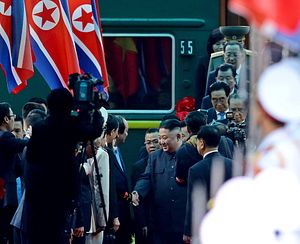To meet with U.S. President Donald Trump in Hanoi, Vietnam, North Korean leader Kim Jong Un spent over 60 hours crossing thousands of miles by train, mostly through China. In fact, it is China that facilitated Kim’s transportation to both U.S.-North Korea summits, last year in Singapore and this year in Vietnam. The Chinese media highlighted that Kim chose to have China’s firm support on his way to meet Trump, twice.
The Hanoi Summit is widely expected to review, solidify, and possibly implement some of the previous agreements reached by the two leaders in Singapore last year, and thus it is also expected to bring up some fresh air to what has been more or less a stalemate, if not outright tension, between two sides in the past months. Both Kim and Trump are seeking substantive achievements that can only be realized by materializing the previous consensuses on paper, given the political and economic situations in both countries. This is particularly true for Trump, who has been entangled with frustrating antagonism from the U.S. Congress for some time.
This is an interesting but critical moment, as the situation in East Asia and particularly in the Korean Peninsula is undergoing a significant transition from confrontation to reconciliation. That’s a good thing for all parties. There are, of course, several important drivers behind all the changes on the Korean Peninsula — for example, each side’s strategic and political assessments of the global and regional situation, particularly Pyongyang’s practical calculation; a political commitment to and national sentiment favoring long-term reunion by the two Koreas; and the re-adjustments of U.S. policy in East Asia by Washington. China, meanwhile, has played an indispensable (though a little subtle at some moments) role to ensure and facilitate this ongoing regional transition, in which China obviously has a great stake.
Kim’s trip is also a goodwill visit to Vietnam in response to an invitation by Vietnamese President Nguyen Phu Trong. Kim Jong Un’s trip saw the first handshake of the leaders of two states since 1964, when Kim Jong Il visited Vietnam. As the two important socialist neighbors bordering China, North Korea and Vietnam are both seeking to revamp their bilateral ties with China. For North Korea, Kim Jong Un’s repeated visits to China in the past year not only dismissed the suspicion that China might have been marginalized in the Korean Peninsula issue, but also proved China’s role as a stabilizer that has been generating strategic assurance to regional peace and stability. At the end of the day, this is what North Korea cannot afford to lose. The Chinese media described Kim’s repeated visits in a relatively short period of time with three important phrases: “traditional friendship,” “[the Korean] peninsula situation,” and “economic development.” As the foundation of China-North Korea relationship, “traditional friendship” has been a priority.
It is almost equally interesting to note that the Sino-Vietnam relationship is undergoing a renewal, particularly since early 2017 when Nguyen Phu Trong, secretary-general of the Communist Party of Vietnam, and the then-president of Vietnam, Tran Dai Quang, visited Beijing one after another. The visits by two members of the Political Bureau of the Communist Party of Vietnam (CPV) suggest that both sides have been seeking to resolidify their traditional friendship and thus bilateral ties, meanwhile blurring the existing differences particularly over the South China Sea issue.
Relations with neighboring countries have always been a priority of China’s diplomacy, particularly since 2013 when the Central Foreign Affairs Leading Group of the Communist Party of China convened a meeting on China’s neighborhood diplomacy. However, this does not mean that China is practicing exclusivism. In fact, the summits between Kim and Trump in both Singapore and Hanoi (or anywhere else in the future, if necessary), the reconciliation of the two Koreas especially since last year, and the handshake of China’s two neighbors at this moment are all consistent with China’s political resolution and commitment to stabilize the regional situation.
Trump has also come a long way to meet Kim Jong Un. Nothing can make up for all the efforts that all parties have put in except for making the summit a good one and ensuring that the old and new agreements are solid, fair, and workable.
































